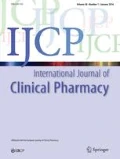Abstract
Medications are perceived as health risk factors, because they might cause damage if used improperly. In this context, an adequate assessment of medication use history should be encouraged, especially in transitions of care to avoid unintended medication discrepancies (UMDs). In a case-controlled study, we investigated potential risk factors for UMDs at hospital admission and found that 150 (42%) of the 358 patients evaluated had one or more UMDs. We were surprised to find that there was no record of a patient and/or relative interview on previous use of medication in 117 medical charts of adult patients (44.8%). Similarly, in the medical charts of 52 (53.6%) paediatric patients, there was no record of parents and/or relatives interviews about prior use of medications. One hundred thirty-seven medical charts of adult patients (52.4%) and seventy-two medical charts of paediatric patients (74.2%) had no record about medication allergies and intolerances. In other words, there was a lack of basic documentation regarding the patient’s medication use history. As patients move between settings in care, there is insufficient tracking of verbal and written information related to medication changes, which results in a progressive and cumulative loss of information, as evidenced by problems associated with clinical transfers and medication orders. Proper documentation of medication information during transfer is a key step in the procedure; hence, it should be rightly performed. It remains unclear whether interviews, and other investigations about medication use history have been performed but have not been recorded as health-care data. Therefore, it is crucial to the improvement of medication use safety that documentation of all drug-related information—even if not directly related to the actual event—become routine practice in health-care organizations, since ‘what is not written does not exist’.
References
Kohn LT, Corrigan JM, Donaldson MS, editors. To err is human: building a safer health system. Washington: National Academies Press; 2000. p. 86–108.
Cornish PL, Knowles SR, Marchesano R, Tam V, Shadowitz S, Juurlink DN, et al. Unintended medication discrepancies at the time of hospital admission. Arch Intern Med. 2005;165(4):424–9.
Mekonnen AB, McLachlan AJ, Brien JA. Effectiveness of pharmacist-led medication reconciliation programmes on clinical outcomes at hospital transitions: a systematic review and meta-analysis. BMJ Open. 2016;6(2):e010003.
Kwan JL, Lo L, Sampson M, Shojania KG. Medication reconciliation during transitions of care as a patient safety strategy: a systematic review. Ann Intern Med. 2013;158(5 Pt 2):397–403.
Monfort AS, Curatolo N, Begue T, Rieutord A, Roy S. Medication at discharge in an orthopaedic surgical ward: quality of information transmission and implementation of a medication reconciliation form. Int J Clin Pharm. 2016;38(4):838–47.
Paim J, Travassos C, Almeida C, Bahia L, MacInko J. The Brazilian health system: history, advances, and challenges. Lancet. 2011;377(9779):1778–97.
Tam VC, Knowles SR, Cornish PL, Fine N, Marchesano R, Etchells EE. Frequency, type and clinical importance of medication history errors at admission to hospital: a systematic review. CMAJ. 2005;173:510–5.
Silvestre CC, Santos LMC, Silva ROS, Santos GAD Jr, Neves SJF, Oliveira-Filho AD, et al. Risk factors for unintentional medication discrepancies at hospital admission: a matched case-control study. Eur J Intern Med. 2017;5(40):e24–5.
Pevnick JM, Shane R, Schnipper JL. The problem with medication reconciliation. BMJ Qual Saf. 2016;25(9):726–30.
Curatolo N, Gutermann L, Devaquet N, Roy S, Rieutord A. Reducing medication errors at admission: 3 cycles to implement, improve and sustain medication reconciliation. Int J Clin Pharm. 2015;37(1):113–20.
Lee KP, Hartridge C, Corbett K, Vittinghoff E, Auerbach AD. “Whose job is it, really?’ Physicians’, nurses’, and pharmacists’ perspectives on completing inpatient medication reconciliation. J Hosp Med. 2015;10(3):184.
Almanasreh E, Moles R, Chen TF. The medication reconciliation process and classification of discrepancies: a systematic review. Br J Clin Pharmacol. 2016;82(3):645–58.
Mueller SK, Sponsler KC, Kripalani S, Schnipper JL. Hospital based medication reconciliation practices: a systematic review. Arch Intern Med. 2012;172:1057–69.
Manias E, Gerdtz M, Williams A, McGuiness J, Dooley M. Communicating about the management of medications as patients move across transition points of care: an observation and interview study. J Eval Clin Pract. 2016;22(5):635–43.
Bobb A, Gleason K, Husch M, Feinglass J, Yarnold PR, Noskin GA. The epidemiology of prescribing errors: the potential impact of computerized prescriber order entry. Arch Intern Med. 2004;164(7):785–92.
Touchette DR, Doloresco F, Suda KJ, Perez A, Turner S, Jalundhwala Y, et al. Economic evaluations of clinical pharmacy services: 2006–2010. Pharmacotherapy. 2014;34(8):771–93.
Zed PJ. Medication reconciliation: more than just a best possible medication history. Can J Hosp Pharm. 2015;68(1):4–5.
Funding
This study was funded by the Coordination for the Improvement of Higher Education Personnel (CAPES), Northern Banking Sector, Block 2, L, Lot 06, CAPES Building. Zip Code 70.040-031 – Brasília, DF - Brazil.
Author information
Authors and Affiliations
Corresponding author
Ethics declarations
Conflicts of interest
All authors declare that they have no conflict of interest.
Rights and permissions
About this article
Cite this article
Silvestre, C.C., Santos, L.M.C., de Oliveira-Filho, A.D. et al. ‘What is not written does not exist’: the importance of proper documentation of medication use history. Int J Clin Pharm 39, 985–988 (2017). https://doi.org/10.1007/s11096-017-0519-2
Published:
Issue Date:
DOI: https://doi.org/10.1007/s11096-017-0519-2

